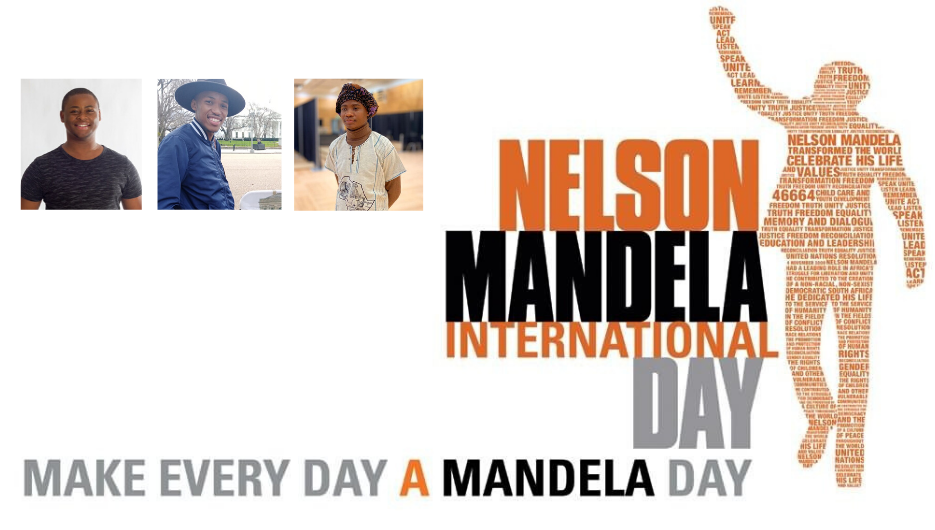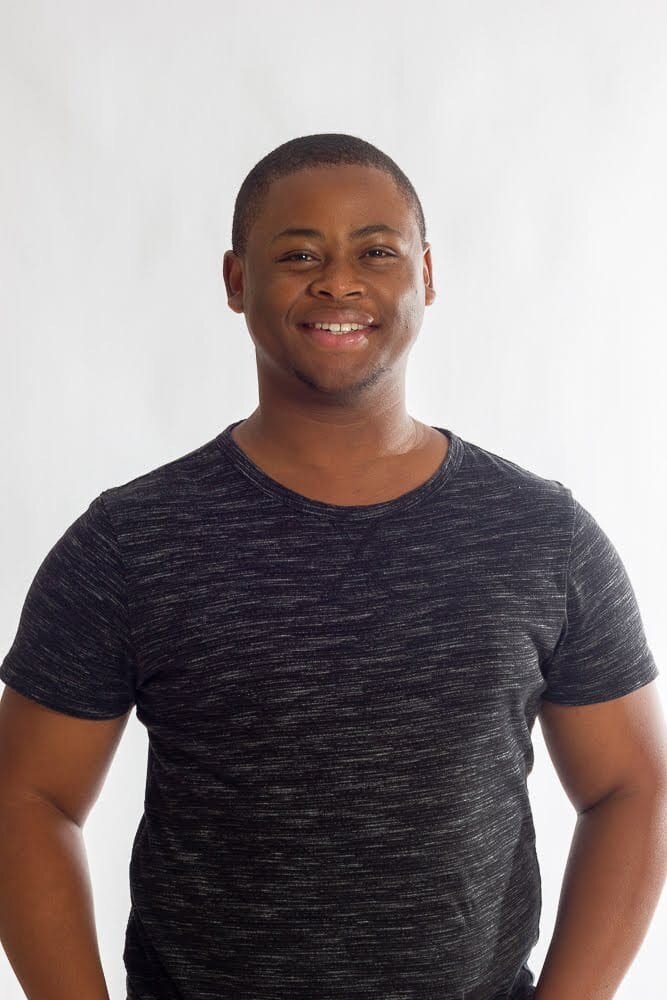Reflections on Mandela Day
On July 18, we recognize Nelson Mandela International Day. To recognize this occasion, we asked South African alumni of our Study of the U.S. Institute on Civic Engagement to write their reflections on what this day means to them. Thank you Kyran Blaauw, Paseka Gaola, and Yanelisa Menzangabom for contributing!
Be Kind for Madiba Day
by Kyran Blaauw
“It is not beyond our power to create a world in which all children have access to a good education. Those who do not believe this have small imaginations.”- Nelson Mandela
Kyran Blaauw participated in the Study of the U.S. Institute on Civic Engagement with FIUTS in 2017
In a country where many of the youth live in abject poverty, must sit in dilapidated classrooms, and are continuously socio-economically side-lined might make it difficult for them to dream of a life beyond. While I lived a life of privilege, it is not my story to tell. But I can use the little privilege I have for the advancement and upliftment of others. It is important that, whenever we can, we must help others achieve a life of comfort.
Education and the quality of education I got played a pivotal part in who I have. Above and beyond that the emotional support that I got from my father too played a critical role in the success that I am achieving and what I am working to. However, it is that support that I got for school and home that made me question the setup of our education system. The schooling experiences of the friends I met when I got to university is vastly different. Where I had resources that prepared me for university, they did not have and had to rely on alternative often third-hand hearsay experiences.
Like Nelson Mandela, I too believe that education is the best way in which we can overcome poverty. It gives you a better standing in a society and improves your chances at leading a better life, just ever so slightly. But when you are warped up in a life where you have to worry about putting food on the table or even being the head of a child-headed household, dreams of going to university or acquiring vocational skills might not be a priority for you.
In a country where we lack scarce skills, we ought to encourage and motivate learners to dream the impossible. We have come too far to still impress on learners that jobs are gendered – which we sadly still do. Spaces should be created where learners are being exposed to careers that they have never even thought about or have only seen and read about on TV and newspapers. That can only become a reality when it is tangible and when they can see it for themselves.
What I normally do for Madiba Day is visit schools with several other people in my communities that I live and have lived in. We speak to learners at schools about life as university student and graduate and what possibilities lay waiting for them beyond their school gates. What is so special about this is that the people that they see look and sound like them and often can related to their lived experiences. I have witnessed and believed that it is important to have someone and know that there is someone rooting for you and is being your cheerleader. Too often dreams and passion die young, because young people do not have someone who is their cheerleader. I am ever so thankful to know that these relationships with learners never end there; it morphs from being a mentorship into a friendship. Seeing someone that you have worked with and mentored achieve great things and share with you some of the milestones they have achieved is heart-warming, or just receiving message on Facebook from someone who just wanted to say thank you for rooting for them.
I think one important part of Madiba Day should not work for the ‘thank you’ that you get at the end of the day. It should be an act of service that you want to do – wholeheartedly. Something that is impactful and not for gratification, because then that is where, personally, lines get blurred. In a whole, the concept of ‘charity’ and ‘charity work’ does not sit well with me. It should be your citizen duty to do something impactful for the betterment of your community – more so in collaboration with them. I had to call myself out many a times, because what you might think is best for a community that you want to work with, might not necessarily be the best for them. Service or community engagement should be something that you do in collaboration with partner communities. They identify a problem and if you have the skills and resources to help solve it –great. It should not be you identifying the problem and you coming up with the solution. Collaboration is key.
While we are observing social and physical distancing in the time of Covid-19 which has shed light, and is continuing to do, on so many social issues globally, we must find alternative ways in which we can show up and act. Let this not be a deterrent or an excuse for you to not want to do something. There is so much that you can do from the comfort of your home, all you need to do is be creative and do research on how you can make a positive change. One of things you and your family can do is: litter picking on the beach or around your neighbourhood, going out to vote, or letting your children (and those in the neighbourhood) write a thank you note for our healthcare workers fighting covid-19. However, an even better act of service would be to wear your mask when in public and to stay at home. Do not unnecessarily the health of other and your own at risk.
Remember to stay safe, be kind to yourself and continue calling out injustices that avoid us from moving forward.
—
Making Every Day a Mandela Day
by Paseka Gaola
One of the key values of being a good leader is to lead by example and pave a way to those who follow you. It is an opportunity to make a difference in the lives of ordinary individuals, to bring about transformation in society and write a new narrative. It is a road full of roller coasters, a journey not many envy to take but as I would say sometimes the journey is worth the destination.
Nelson Rolihlahla Mandela or Madiba as his peers will call him is one of the few who understood all that. He dedicated his life for the liberation and emancipation of a black child and became the first black South African President after being imprisoned for 27 years by the apartheid government in 1964; but this not a history class.
Every year on July 18th the world celebrate #MandelaDay. It is a global call of action not only for leaders but for individual and organisations to be a helping hand to those in need and promote the culture of giving. It is a day that many go out from all corners of the world to make a difference to their respective community members who are in need and organisations that are in service to serve humanity.
I believe that every day should be a Mandela Day, every day should be MLK day. Every day should be a day to helping those in need. It is a culture that must be adopted in our communities, giving and helping should be values that are instilled in young people. No one deserves to sleep with an empty stomach, live in an unfavourable environment or be deprived of any opportunity to exercise their human rights. No matter how poor one may be, there is always something one can give. Everyone possesses the gift of giving, and as you give you make a room for more.
As we celebrate Mandela Month in the middle of a pandemic remember to be a helping hand, give without expecting anything in return. As you are doing your shopping with friends and family, there are boxes in almost every shopping store to help those in need, just drop one or two items from your shopping bag to help those in need and build the society that is inspired the spirit of Ubuntu. Remember ubuntu ngumuntu ngabantu - I am because you are.
—
United in Diversity
by Yanelisa Menzangabom
Yanelisa Khulubuse Menzangabom participate in the SUSI on Civic Engagement with FIUTS in 2020
Mandela Day. Tata Nelson Rholihlahla Mandela, our global icon, recognized and celebrated worldwide. As South African I stand proud to claim Tata Mandela as one of our greatest heroes in the world. We might not agree on what our late father of the Nation uTata Nelson Mandela represents, and what he means to each individual. However, we cannot deny that Mandela embodied Ubuntu, peace, forgiveness and reconciliation. After all the crimes, human rights violation, dispossession and dehumanisation that was inflicted against Black people in South Africa, Mandela thought us that Ubuntu is the only weapon that can certainly unite the country. While we were not certain and still are not, about what other avenues post Apartheid would have bred in our country, it is evident that what Nelson Rholihlahla Mandela taught us, gave us a better country. He himself was once a member of armed struggle wing named Umkhonto weSizwe (the Spear of the Nation), but he later convinced our leaders to have a peaceful approach.
Today we stand with confidence and shout with pride, "United in diversity", because of sacrifices that uTata Mandela and other renowned struggle stalwarts made. Again, we might have contradicting views about uTata Mandela but we have million reasons to celebrate him and honor him as a symbol of peace and Ubuntu.
Viva Nelson Rholihlahla Mandela. Long live the undying spirit of Mthikrakra! Dlomo!
—
SUSI programs promote a better understanding of the people, institutions, and culture of the United States among international students, teachers, and scholars. Study of the U.S. Institutes (SUSIs) are short-term academic programs for groups of undergraduate leaders, educators, and scholars from around the world. Hosted by academic institutions throughout the United States, these 5- to 6-week Institutes include an intensive academic residency and an integrated educational study tour. Extracurricular cultural and community activities help to broaden the participants’ understanding of U.S. society. Learn more about SUSI programs here.
Guest posts on the FIUTS blog represent the experiences and views of individual writers. They do not necessarily reflect the views of FIUTS or any organizations or institutions affiliated with our programs.




